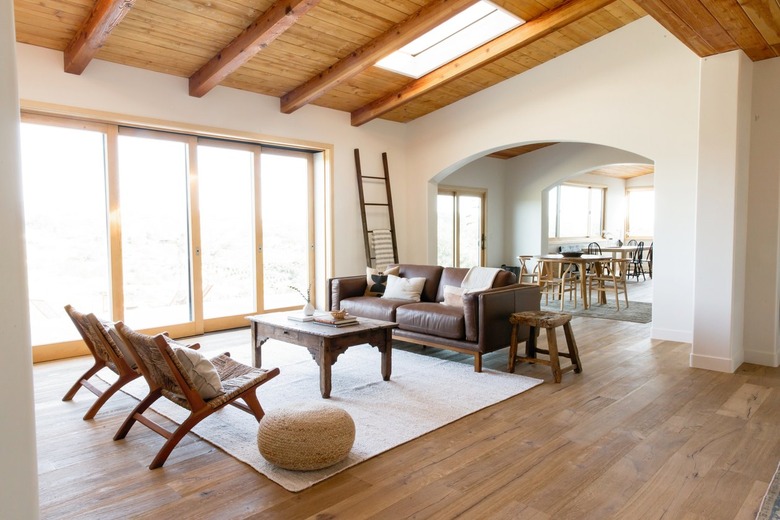These Are The Challenges Millennial Home Buyers Are Facing
Millennials have dealt with a lot, from being blamed for being in debt (remember the continual avocado toast shaming?) to facing crisis after crisis. Now, the COVID-19 pandemic has specifically impacted the age group in a new way — it's made it harder for them to buy homes. A new survey released by Angi, formerly known as Angie's List, is highlighting the impact that COVID-19 has had on millennial home buyers — and we can't stop thinking about what it means for the future of home ownership.
Of the 1,000 adults Angi surveyed between ages 25 and 39 who bought homes during the pandemic, 70% said the pandemic played a role in their decision to buy a new home; 27% even said it was the primary factor in their decision. Whether fed up with tiny spaces or freed to move from bigger, more expensive cities with an influx of work from home opportunities, more millennials took the pandemic to heart and sought out more space. But that didn't mean it was easy.
The same survey explains that 42% of home buyers spent six months or longer searching for a home, and 49% of millennials said the housing market was more competitive than they expected.
"Millennials are a historically large generation and many are entering prime home-buying age," Matt Kreamer, Manager of Data Public Relations at Zillow, tells Hunker. "Most millennial home buyers are buying their first home, meaning they don't have proceeds from the sale of an existing home like some repeat buyers they may be competing with. In a recent Zillow survey of real estate agents, all-cash offers were named as the best strategy to win a competitive offer, which is much more difficult for many millennials who are first-time buyers."
Between hidden costs and confusing lingo, home buying is rarely a piece of cake — especially if you're on the search for your dream home. But the pandemic certainly complicated things. For starters, it shifted the way many of us work.
"Someone who lost their stable job due to the pandemic may have started an independent contractor position to make ends meet temporarily, or may have started job hopping," realtor Daniela Pereyra told Hunker. "This type of unstable employment unfortunately hurts an aspiring home buyer because typically a bank providing a loan would need about two years of stable income proof for someone working independently. This delays a person's ability to qualify for a home loan."
It's tricky even on the best of days to have tens of thousands of dollars saved for a down payment. The average down payment is on average about six percent of the borrower's loan value, but having that kind of money (and any real savings account) became more difficult in the midst of COVID-19.
"Aspiring homebuyers who had funds saved up for a downpayment [or] closing costs and ended up losing their source of income, may be forced to use their savings to make ends meet — ultimately delaying their home buying timeline," Pereyra says.
It's not all doom and gloom, however. Experts say that it's possible to bounce back. If you're hoping to become a millennial homeowner post-COVID, there are a few initial steps you can take.
Pereyra advises "maintaining your credit score as high as possible, setting funds aside for a down payment and/or closing costs, and stabilizing your income as much as possible."
If there's one thing to focus on, Kreamer notes, it's being realistic.
"Buyers should focus on finding a home where they know they can afford the monthly payments and the cost of upkeep, in a place they plan to live for at least a few years," Kreamer says. "Buyers should be realistic about the competitive market they're walking into and enlist a trusted agent to advise on local trends."
This means being flexible, too. "With the market this competitive, buyers should be prepared for a bidding war and perhaps look for homes with list prices below their max budget to provide some breathing room to offer above list if needed," Kreamer adds. "It's also helpful to be pre-approved for a mortgage so you can move quickly when you find a home you like."
